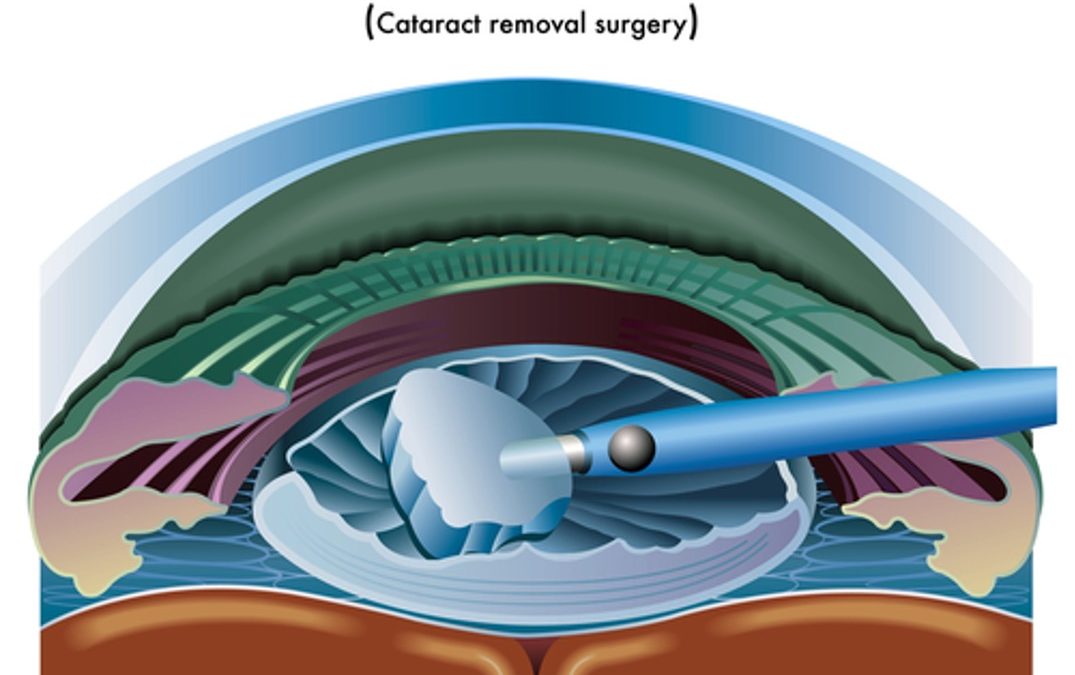What is a cataract and how does this affect my vision?
Cataract is a common condition that causes the lens inside our eye to become cloudy.
The lens is a clear disc that sits in the front section of our eye and helps us see clearly. As this lens becomes cloudy over time, it can cause problems with your vision.
You may not have any symptoms at first, when cataracts are still mild. As they develop, however, you may start to experience problems with your vision such as;
- Blurry or misty vision
- You see a halo around lights
- Lights (sun, lamps, street lights etc.) seem too bright
- Double vision
- Frequent change in your prescription
- Reduction in intensity of colours
What causes cataract?
Cataracts usually develop as part of the natural ageing process. As we become older, our eyes change and the lens becomes cloudy. This usually affects both eyes but may happen faster or look different in one eye.
There are other factors that may cause cataracts to develop quicker; for example, eye injuries, previous history of eye surgery, ocular inflammation and/or infection, glaucoma, diabetes, smoking and certain medications such as oral steroids.
How is a cataract treated?
Surgery is the only treatment for cataracts.
Without surgery, cataracts will continue to grow and may cause increasing problems with your vision. The timeframe that this happens is different in everyone. In some people, the cataract can develop over a few months, but in others, it may take years.
Cataract surgery involves removing the cloudy lens and replacing it with an artificial one to improve your eyesight.
What does cataract surgery involve?
Cataract surgery is a common operation with a high success rate.
Before surgery
You will be reviewed by the eye surgeon and undergo some assessments to examine and take measurements from your eyes. Your doctor will discuss surgery with you in further detail, including the risk and benefits of surgery, the type of artificial lens that will be used and whether or not you will need glasses after surgery.
During surgery
Cataract surgery is usually carried out in the day surgery unit and you will be able to go home on the same day. The surgery is usually performed using local anaesthetic, which means you will be awake during the surgery but your eye will be numbed using drops or an injection.
The surgery itself usually takes between 20 to 30 minutes. During the operation, the surgeon makes small incision in your eye and uses a machine to take the cloudy lens out. The surgeon then inserts an artificial lens into the eye, which will replace your cloudy lens.
After surgery
It will take approximately 4 weeks for your eye to heal after cataract surgery. After surgery, you will be prescribed eye drops to help the recovery process.
What are my lens options?
Intraocular lenses that are available on the NHS are monofocal in their function. This means that the lens implant can only correct farsightedness (hyperopia) or shortsightedness (myopia) and not both. These lenses also don’t address the issue of pre-existing astigmatism in your eye.
Astigmatism in simple terms means that the curvature of the cornea, the front window of the eye, is not a perfect curve and is irregular. The eyeball in people with astigmatism is shaped more like a rugby ball rather than a football. Thus if there is no or minimal astigmatism, a monofocal lens could get rid of EITHER your reading OR distance glasses. If your eye has significant pre-existing astigmatism is significant, then you will probably need glasses for far and near regardless after surgery.
However ‘premium lenses’ exist (e.g toric, multifocal) which can correct both near and far vision as well as astigmatism, reflecting the function of the natural lens. Patient selection and discussing patient expectations is of paramount importance when choosing a premium intraocular lens.
At the time of your consultation, Mr Kashani will go through the list of pros and cons of having a premium intraocular lens in comparison to a monofocal intraocular lens and he will discuss what you may expect after the surgery. It is important to choose the correct lens as ‘lens exchange’ requires further surgery and should be avoided if possible due to surgical risk.
What are the risks with cataract surgery?
By far the most catastrophic risk is infection inside the eye which thankfully is rare (less than 1 in 1000). Other risks include bleeding, rupture of the back capsule, dropped lens and retinal tear with or without retinal detachment. These other complications may require further surgery to improve vision. Although this list is not exhaustive, the great news is that cataract surgery is normally straightforward with over 99 % success rate.
What are the advantages of private cataract surgery?
There are several advantages to having your cataract surgery privately. The most important advantage is that you will have a named consultant surgeon operate on your eye at a time and place that is convenient to you.
Secondly NHS waiting list can be long and if you require cataract surgery in both eyes then the time will add up which may not be convenient for you. Private cataract surgery can speed up this process. Finally, the option of a “premium lens” in order to achieve spectacle independence following cataract surgery is only available on a private basis.
Where can I get more information?
For further information on cataract surgery please visit:
https://eastbourneeyesurgeon.co.uk/cataract-surgery/
If you wish to see an animation for cataract surgery please visit:
https://eastbourneeyesurgeon.co.uk/cataract-animation/
Additional Help
If you think you may have a cataract and would like more information about cataract surgery, and your treatment options, do get in touch here.
